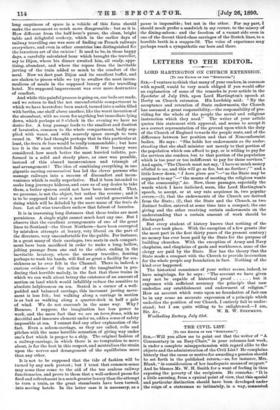LETTERS TO THE EDITOR.
LORD HARTINGTON ON CHURCH EXTENSION. [To TES EDITOR OP TEE "SPECTATOR."] SIBr—I venture to think that many of your readers, in common with myself, would be very much obliged if you would offer an explanation of some of the remarks in your article in the Spectator of July 19th, upon Lord Hartington's speech at Derby on Church extension. His Lordship said : " By the acceptance and retention of State endowments, the Church has assumed a great responsibility,—the responsibility of pro- viding for the whole of the people the moral and religions instruction which they need." The writer of your article quotes this statement with approval, and seems to accept it as a correct representation of the ground upon which the duty of the Church of England towards the people rests, and of the difference between her position and that of Nonconformist bodies. He says : " She holds her endowments on the under- standing that she shall minister not merely to that portion of the population which can afford to pay, or is willing to pay for- the services she renders, but to that portion of the population which is too poor or too indifferent to pay for those services.' And again, " The Church must not say, 6 I have so much money allotted to me, and this will go so far, but no further ;" and a little lower down, " I have given you"—" so the State may be supposed to say "—" the means of meeting the religious wants of the community," &c. Now, these passages, especially the- words which I have italicised, seem, like Lord Hartington's speech, to accept, or at any rate acquiesce in, two popular errors,—(1), that the endowments of the Church are derived from the State; (2), that the State and the Church, as two. distinct bodies, entered at some time into a compact, the one- giving and the other receiving certain endowments on the understanding that a certain amount of work should be discharged.
But every student of history knows that nothing of the kind ever took place. With the exception of a few grants (for the most part in the first thirty years of the present century> no money has ever been paid by the State for the purpose of building churches. With the exception of Army and Navy chaplains, and chaplains of gaols and workhouses, none of the clergy are paid by the State. Nor has the theory that the State made a compact with the Church to provide instruction for the whole people any foundation in fact. Nothing of the- kind ever happened.
The historical conscience of your writer seems, indeed, to. have misgivings, for he says " The account we have given may not be capable of historical proof but it expresses with sufficient accuracy the principle that now underlies any establishment and endowment of religion."' How an account which rests upon no foundation of fact can be in any sense an accurate expression of a principle which underlies the position of our Church, I entirely fail to under- stand; but I am quite willing to be enlightened.—I am,.
Sir, &c., W. R. W. STEPHENS. Woolbeding Rectory, July 21st.


































 Previous page
Previous page